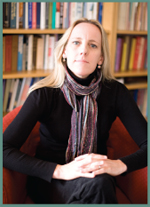Deep Ecology, Humanism, and the Hidden Life of Trees

I’VE LONG BEEN what the author of this issue’s cover story and other animal welfare advocates would call a human speciesist. This means that I unequivocally value human welfare over that of nonhuman species. If I could save either my daughter or my cats from a burning building, I’d save my daughter. If I could save a total stranger or my cats from a burning building, I’d save the stranger. And so on. But I’m learning that speciesism, as Ed Gibney very thoughtfully outlines here, is more than that. It’s denying the inherent worth of nonhuman animals and living things. Of course this isn’t good for them, and, as some people strongly believe, it isn’t good for us either.
But isn’t promoting the inherent worth of all living things a bit of a stretch when we aren’t doing such a hot job affirming the inherent worth and dignity of so many of our own species? (Case in point: the water crisis in Flint, Michigan, examined in this issue by Gregory Shafer and his students and which may just be the tip of the iceberg of toxic water in the United States.) Racism, sexism, religious extremism (the dangers of which Phil Torres rationally analyzes herein), income inequality… the list of ways in which humans’ worth is undercut is astounding.
But the point of deep ecology—which increasingly intrigues me as it’s motivated by a love of nature and for all humans—is that restructuring human values and culture can help preserve the diversity of natural systems to the benefit of more than just ourselves. “None of this means we all have to become vegans or be like the Buddhists of Mongolia who refuse agriculture and curl their boots so as not to break the earth and disturb sentient creatures when they walk,” says Gibney. But he does ask us to tweak our definition of humanism to extend our concerns to other living things in order to forge a more “balanced and durable” humanism. I think the idea is worth considering.
I had all this in mind when I came upon a charming piece in the New York Times recently titled, “Where We See Tangled Trees, He Sees Social Networks.” It profiles a career forest ranger in Germany named Peter Wohlleben whose book, The Hidden Life of Trees, is a runaway bestseller at home and is soon to be translated and published in nineteen countries. Wohlleben strikes me as a deep ecologist who, as explained in the article, describes trees as beings that “count, learn and remember; nurse sick neighbors; warn each other of danger by sending electrical signals across a fungal network…and, for reasons unknown, keep the ancient stumps of long-felled companions alive for centuries by feeding them a sugar solution through their roots.” To those who accuse him of anthropomorphizing, Wohlleben says using a human language is his intent, as it attaches emotion to his subject and increases understanding: “When I say, ‘Trees suckle their children,’ everyone knows immediately what I mean.”
Perhaps there will come a day when we’ll say that humanism isn’t just about us, and we’ll know exactly what we mean.
